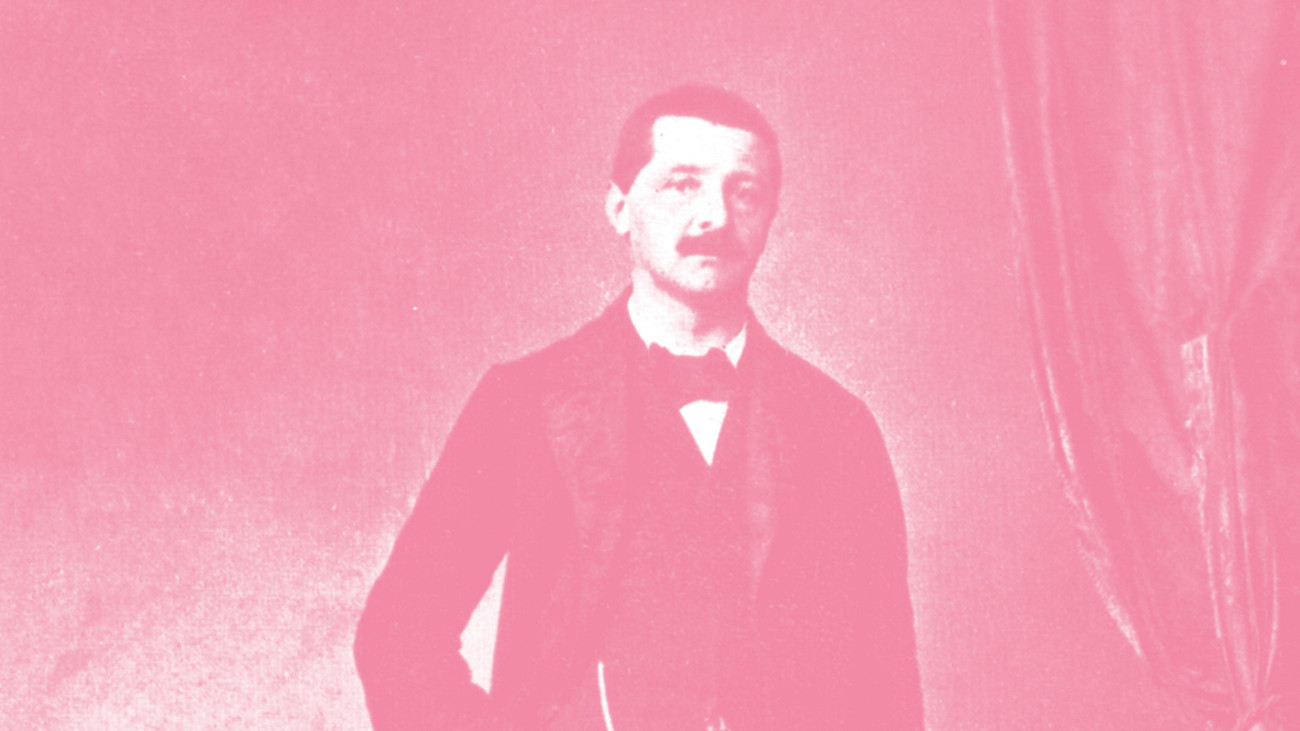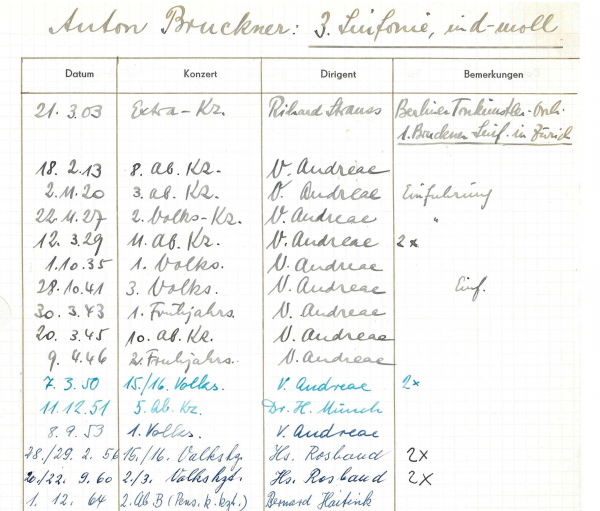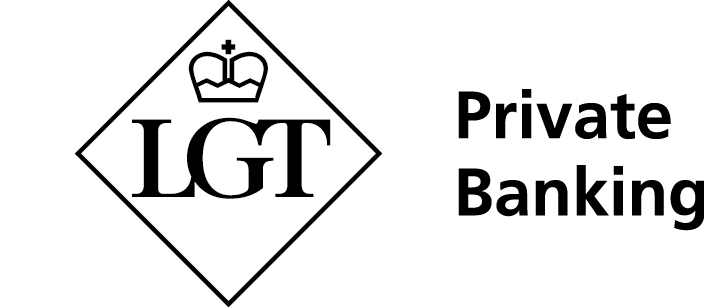
Bruckner Cycle
Since January 2022, Paavo Järvi has been realising a Bruckner cycle with the Tonhalle-Orchester Zürich that spans several seasons. A look at the story of our dramaturge Ulrike Thiele shows how well this composer suits us.
From the very beginning, the Tonhalle-Orchester Zürich was committed to performing "novelties", i.e. contemporary music. At the time of the opening of the new Tonhalle in 1895, these were works by Johannes Brahms and Richard Strauss. The driving force was initially Friedrich Hegar, the first chief conductor of the Tonhalle-Orchester Zürich, who maintained excellent contacts with the leading musicians and composers of the time. In January 1898, Strauss himself came to Zurich to conduct "Also sprach Zarathustra" - the way Hegar "rehearsed the work and had the strings line up on the podium [...] was the talk of the town at the time" (E. Isler, Neujahrsblatt 1935)
A particular programmatic constant again goes back to Strauss, who performed Bruckner for the first time in 1903 as a guest appearance with the Berlin Philharmonic Orchestra, namely his Symphony No. 3.
Volkmar Andreae, who took over from Hegar as chief conductor in 1906, gave further Zurich premieres: Symphony No. 9 in 1907 and Symphony No. 4 in 1909. In the first decades, the Fourth and Third were performed particularly frequently, followed by the Eighth and Seventh. With his numerous Bruckner performances, Andreae founded the Bruckner tradition that extends to the present day and is now being continued with the Bruckner cycle by Paavo Järvi and the Tonhalle Orchestra Zurich.
For our Music Director, Bruckner is particularly well suited to the orchestra:
"With its great classical-romantic tradition, the Tonhalle-Orchester Zürich is ideally suited to Bruckner, this central composer for modern symphonic orchestras. If Bruckner's music has been repeatedly dismissed as 'static' in the past, this is an injustice. For this is above all a problem of interpretation. His music has the same merits, values and aspects of the symphonies of Brahms, Mendelssohn, Schumann and Beethoven, for example. Bruckner is the natural continuation of this tradition. Even though the Tonhalle-Orchester Zürich has often played Bruckner and I have also conducted it, I am looking forward to discovering many new things together. And the Symphonies Nos. 4 and 7 at the beginning of this cycle are two works that are rightly very popular: because they speak directly to us."

A look into the archives of the Tonhalle-Gesellschaft Zürich: First Bruckner performance in Zurich in 1903
Bruckner's works in Zurich and Switzerland
1880 Bruckner travels through Switzerland and presumably plays his own works on various organs
21. November 1896 The first documented performance of a work by Bruckner in Switzerland takes place in Lucerne: three movements from his Symphony No. 7
21. March 1903 A (complete) symphony by Bruckner is performed in Switzerland for the first time: Symphony No. 3 at a guest performance by the Berlin Tonkünstler Orchestra in the Tonhalle Zurich conducted by Richard Strauss
29. November 1903 In Basel, Hermann Suter, one of the most important early promoters of Bruckner's works in Switzerland, performs the Symphony No. 8
07. March 1904 The Symphony No. 4 is performed for the first time in Switzerland: in Geneva under Willy Rehberg
20./21 January 1919 First performance of Symphony No. 4 in Zurich, with the Tonhalle-Orchester under Volkmar Andreae
1927/28 Volkmar Andreae performs all Bruckner symphonies in a cycle in one season and makes Zurich a centre for the cultivation of Bruckner's music
1942 to 1948 In the 1940s, Andreae continued to programme Bruckner's symphonies in close succession, documented by recordings from Radio Beromünster.
1953 First complete recording of Bruckner's symphonies by Volkmar Andreae with the Vienna Symphony Orchestra
Since the 1950s, when Volkmar Andreae succeeded him as chief conductor, renowned chief conductors and guest conductors have dedicated themselves to Bruckner's works and brought their interpretations to the Tonhalle-Orchester Zürich:
Hans Rosbaud (1952 No. 2, 1954/58 No. 6, 1955 No. 4, 1956/60 No. 3, 1957 No. 9, 1962 No. 1), Bruno Walter (1954 No. 9), Otto Klemperer (1956 No. 7), Erich Schmid (1960 No. 1, 1969/87 no. 6), Joseph Keilberth (1960 no. 7, 1964 no. 6, 1966 no. 8, 1968 no. 4), Bernard Haitink (1964 no. 3, 2003 no. 6, 2007 no. 8, 2009 no. 5, 2017 no. 4, 2018 no. 7), Rudolf Kempe (1966 no. 4 and 7, 1967/72 no. 5, 1968/71 no. 8, 1970 no. 9), Wolfgang Sawallisch (1966 no. 6, 1973 no. 3), Vaclav Neumann (1971 no. 4), Karl Böhm (1971 no. 7, 1974 no. 8), Ferdinand Leitner (1973 no. 9, 1974 no. 4, 1976/81 no. 6), Günter Wand (1975 no. 5), Christoph von Dohnányi (1976 no. 3, 2013 no. 4), Gerd Albrecht (1978 no. 4, 1977 no. 8, 1977/78 no. 7 incl. tour), Christoph Eschenbach (1982/86 no. 7, 1983 no. 4, 1984 no. 8, 1990 no. 6), Lorin Maazel (1987 no. 3), Giuseppe Sinopoli (1987 no. 7), Kurt Masur (1990 no. 3), Kurt Sanderling (1990 no. 4, 1997 no. 3, 2001 no. 7), David Zinman (1996 no. 7 and 8, 1998/2016 No. 5), Herbert Blomstedt (1996 No. 9, 2009 No. 2, 1999/2019 No. 4, 2012 No. 8), Marek Janowski (2001, No. 1), Mariss Jansons (2003 No. 3), Andris Nelsons (2011 No. 4), Kent Nagano (2015 No. 6), Michael Sanderling (2016 No. 4), Franz Welser-Möst (2017 No. 8), Juanjo Mena (2019 No. 6)
June/July 2005 The last major Bruckner cycle with the Tonhalle-Orchester Zürich took place as part of the Zurich Festival: the "Zeroth", Symphonies No. 1, No. 2 and No. 6 conducted by Stanislaw Skrowaczewski, No. 3 with Riccardo Chailly, No. 4 with Philippe Herreweghe, No. 5 and No. 8 with Herbert Blomstedt, No. 7 and No. 9 with Bernard Haitink
No results







